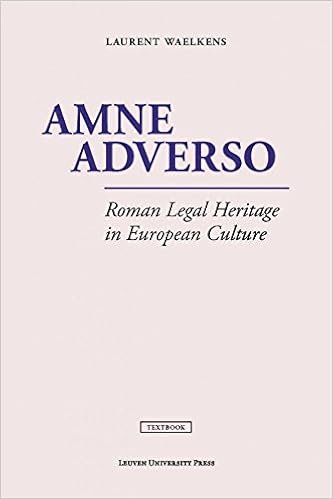Another textbook in English on Roman Law is always to be welcomed. A lively market in them indicates the continuing vitality of the discipline; good textbooks encourage students to learn and also to opt for the subject. It is also good to have diversities of approach. There is, for example, Borkowski’s Roman Law, in a new 5th edition, by this blogger’s colleague Paul du Plessis; our colleague in Glasgow, Ernie Metzger, has provided a new introduction to Barry Nicholas’s Introduction to Roman Law.
Leuven University Press has just published Amne Adverso: Roman Legal Heritage in European Culture by Laurent Waelkens. Your blogger should instantly admit that he has known Professor Waelkens for a good many years. Each textbook has its own unique point. That of Waelkens has a Belgian – even Leuven – focus, and pays a great deal of attention to the later development of Roman law. In this and in other ways it reflects Waelkens’ own scholarship. It has an interesting introduction on the science of Roman law, and a lengthy chapter providing an overview of the external history and sources of Roman law, that also deals with the history to the nineteenth century.
Each era produces different scholarship with a different focus. This book has a focus on human rights. It is a regular theme, after an interesting chapter. It has a good chapter on procedure, before turning to persons, inheritance, property, obligations, and socio-economic law. Thus traditional categories are interestingly mixed with modern.
Readers of this blog should not fear that scholarly rigour and historical understanding have been sacrificed for contemporary obsessions; they have not. And your blogger firmly believes that all true research should be useless! That is, research in historical and scholarly disciplines for some immediate practical purpose is nearly always poor research, motivated by the desire to please policy makers, rather than by the disinterested pursuit of knowledge and interpretation to which all scholarship should aspire; utilitarian research necessarily defeats its utilitarian aims. One does wonder to what extent in the modern world Alexander Fleming might not have been hailed as the discoverer of penicillin, but instead disciplined for having an untidy laboratory. This said, Waelkens’ book has the necessary uselessness to make it truly useful and insightful, and it can be recommended to all.



Comments are closed, but trackbacks and pingbacks are open.